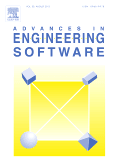
ADVANCES IN ENGINEERING SOFTWARE
Scope & Guideline
Transforming Ideas into Engineering Excellence.
Introduction
Aims and Scopes
- Software Development for Engineering Applications:
The journal emphasizes the development of software tools and frameworks that support various engineering disciplines, including structural, mechanical, and civil engineering. - Computational Methods and Optimization:
A core area of focus involves computational methods, particularly optimization techniques in engineering design, structural analysis, and material performance. - Integration of Machine Learning and AI:
There is a strong emphasis on the application of machine learning and artificial intelligence to enhance engineering processes, predictive modeling, and data analysis. - Simulation and Modeling Techniques:
The journal covers advancements in simulation methodologies, including finite element analysis, computational fluid dynamics, and other numerical approaches for solving complex engineering problems. - Interdisciplinary Approaches:
The journal promotes interdisciplinary research that combines engineering with fields such as computer science, material science, and environmental science to address complex challenges. - Real-world Engineering Applications:
Papers often highlight practical engineering applications, demonstrating how innovative software solutions can be applied in real-world scenarios to improve efficiency and effectiveness.
Trending and Emerging
- Machine Learning and Data-Driven Approaches:
Recent publications reflect a growing trend towards integrating machine learning techniques into engineering applications, enhancing predictive capabilities and optimizing designs based on data analysis. - Digital Twins and Simulation Frameworks:
The concept of digital twins is gaining traction, with research focusing on creating virtual replicas of physical systems for real-time monitoring and simulation, allowing for more effective design and maintenance. - Advanced Optimization Techniques:
There is an increasing focus on sophisticated optimization algorithms, including metaheuristic and hybrid approaches, which are being applied to complex engineering problems. - Multi-Disciplinary Design Optimization (MDO):
Emerging works highlight the importance of MDO, emphasizing collaborative and integrative strategies that combine various engineering disciplines to optimize designs comprehensively. - Sustainability and Green Engineering:
A notable trend is the emphasis on sustainable practices and green engineering solutions, reflecting the global push towards environmentally friendly designs and materials. - Real-Time and Adaptive Systems:
Research is increasingly focusing on real-time systems and adaptive algorithms that respond dynamically to changing conditions in engineering applications, enhancing performance and reliability.
Declining or Waning
- Traditional Numerical Methods:
There has been a noticeable decrease in the publication of papers focused solely on traditional numerical methods, such as basic finite element methods or classical computational techniques, as more advanced and hybrid approaches gain traction. - Static Structural Analysis:
Research centered around static analysis methods is becoming less common, with a shift towards dynamic and time-dependent analyses that consider real-world conditions more effectively. - Basic Software Development Tools:
The focus on basic software development tools and libraries has diminished, as researchers now favor more complex, integrated solutions that combine multiple functionalities and advanced algorithms. - Conventional Material Modeling Techniques:
There is a decline in studies that utilize conventional material modeling approaches, with an increasing preference for innovative materials and multi-scale modeling techniques.
Similar Journals
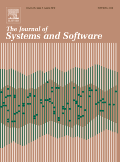
JOURNAL OF SYSTEMS AND SOFTWARE
Leading Insights in Systems and Software Research.JOURNAL OF SYSTEMS AND SOFTWARE, published by Elsevier Science Inc, is a premier academic journal that serves as a vital platform for the dissemination of cutting-edge research in the fields of software engineering, information systems, and hardware architecture. With an impressive impact factor and consistently ranking in the Q1 category across several relevant sectors, including hardware and architecture (ranked 33rd out of 177), information systems (ranked 72nd out of 394), and software (ranked 75th out of 407) as of 2023, this journal is recognized for its rigorous peer-review process and high-quality publications. Established in 1979, the journal has become an essential resource for researchers, professionals, and students looking to stay abreast of the latest advancements and emerging trends in systems and software. While the journal does not currently operate under an open-access model, it ensures wide visibility through its indexed publications and is dedicated to advancing scholarly discourse in computer science. With contributions from leading experts in the field, JOURNAL OF SYSTEMS AND SOFTWARE continues to shape the landscape of software and systems research.

JOURNAL OF MACHINE LEARNING RESEARCH
Exploring Innovations in Machine Learning and StatisticsJOURNAL OF MACHINE LEARNING RESEARCH, published by MICROTOME PUBL, stands as a premier journal in the realms of Artificial Intelligence, Control and Systems Engineering, Software, and Statistics and Probability. With an impressive Q1 ranking across multiple categories and a prominent Scopus ranking that places it among the top journals in its field—ranked 1st in Mathematics and 20th in both Artificial Intelligence and Software—this journal serves as a vital resource for cutting-edge research and advancements in machine learning. Established in 2001, it has been committed to disseminating high-quality research findings and innovative methodologies, addressing the evolving challenges and opportunities in machine learning. Furthermore, the journal maintains a rigorous peer-review process, ensuring that only the most significant contributions are published. With open access options available and a strong user-friendly platform, it invites researchers, professionals, and students to engage deeply with the pioneering work in the field.
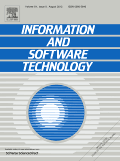
INFORMATION AND SOFTWARE TECHNOLOGY
Elevating Research Standards in Information and Software TechnologyINFORMATION AND SOFTWARE TECHNOLOGY, published by Elsevier, is a leading journal that stands at the forefront of the fields of software engineering, information systems, and computer science applications. Since its inception in 1970 and with a focus extending to 2025, this esteemed publication has made significant contributions to the discourse on technological advancements and innovations. In 2023, it has achieved a remarkable Q1 categorization across multiple domains, including Computer Science Applications, Information Systems, and Software, reflecting its excellence and relevance in the academic community. With Scopus rankings that place it in the top percentiles in its categories (85th, 83rd, and 83rd respectively), the journal serves as an essential platform for researchers, professionals, and students eager to disseminate and engage with cutting-edge research and developments. While it does not currently offer Open Access options, the knowledge curated within its pages remains invaluable for advancing the fields of information technology and software development.
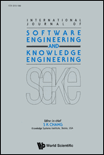
INTERNATIONAL JOURNAL OF SOFTWARE ENGINEERING AND KNOWLEDGE ENGINEERING
Navigating the Evolving Landscape of Software EngineeringThe INTERNATIONAL JOURNAL OF SOFTWARE ENGINEERING AND KNOWLEDGE ENGINEERING, published by WORLD SCIENTIFIC PUBL CO PTE LTD in Singapore, is a pivotal platform for disseminating cutting-edge research in the fields of software engineering and knowledge systems. With an ISSN of 0218-1940 and an E-ISSN of 1793-6403, this journal has been a reliable resource for scholars and practitioners since its inception in 1996. The journal is indexed across multiple prestigious databases, reflecting its relevance with a Category Quartile ranking of Q3 in both Computer Graphics and Computer Networks for 2023, and it maintains a steady trajectory of growth and scholarly contribution. Although not an Open Access journal, it is accessible through various academic institutions and libraries, ensuring researchers can engage with high-quality, peer-reviewed articles that explore advancements, theoretical developments, and practical applications in software and knowledge engineering. As it converges towards its end year of 2024, this journal continues to foster innovation and knowledge exchange, making it an essential resource for anyone invested in these dynamic fields.

Software and Systems Modeling
Transforming Ideas into Systematic SolutionsSoftware and Systems Modeling is a premier journal published by Springer Heidelberg, dedicated to advancing the fields of software engineering, modeling, and systematic design. With an ISSN of 1619-1366 and an E-ISSN of 1619-1374, this journal has established itself as a critical resource for researchers and practitioners alike since its inception in 2005. The journal currently holds a Q1 quartile ranking in the Modeling and Simulation category and a Q2 ranking in Software, reflecting its influential contributions to the field. Its Scopus rankings further underscore its relevance, positioned at #55 in Modeling and Simulation and #139 in Software, with impressive percentiles of 83rd and 65th respectively. Although it does not currently offer open access, it remains an essential platform for disseminating innovative research and fostering dialogue among professionals in Germany and beyond. The journal’s objective is to publish high-quality articles that contribute to the understanding and development of software and systems modeling, ensuring ongoing advancements in this dynamic arena.
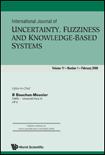
INTERNATIONAL JOURNAL OF UNCERTAINTY FUZZINESS AND KNOWLEDGE-BASED SYSTEMS
Bridging the gap between theory and application in fuzzy logic.Welcome to the INTERNATIONAL JOURNAL OF UNCERTAINTY FUZZINESS AND KNOWLEDGE-BASED SYSTEMS, a prestigious publication dedicated to advancing the fields of artificial intelligence, control systems engineering, information systems, and software research. Published by WORLD SCIENTIFIC PUBL CO PTE LTD in Singapore, this journal serves as a vital forum for the dissemination of innovative theories, methodologies, and applications rooted in the coexistence of uncertainty and fuzziness within knowledge-based systems. With its ISSN 0218-4885 and E-ISSN 1793-6411, the journal consistently ranks in the Q3 category across various Scopus categories, including Control and Systems Engineering and Information Systems, reflecting its influential position in the academic community. Researchers and practitioners alike will find valuable insights and the latest trends through its comprehensive articles, making this journal an essential resource for those seeking to navigate the complexities of this evolving field.

INTEGRATED COMPUTER-AIDED ENGINEERING
Bridging Theory and Application in Engineering ExcellenceINTEGRATED COMPUTER-AIDED ENGINEERING (ISSN: 1069-2509, E-ISSN: 1875-8835) is a prominent journal published by IOS PRESS in the Netherlands, renowned for its rigorous coverage of the interdisciplinary fields of artificial intelligence, computational theory, and software applications. Since its inception in 1993, this journal has consistently contributed to the academic discourse, standing out in the Q1 and Q2 quartiles across various categories as of 2023. With Scopus rankings placing it in the93rd percentile for computational theory and mathematics and 91st for theoretical computer science, it is a vital resource for researchers and professionals seeking to explore innovative methodologies and advanced engineering solutions. While not an open-access journal, INTEGRATED COMPUTER-AIDED ENGINEERING provides comprehensive access options for institutional subscribers, ensuring the dissemination of vital research findings to a global audience. This journal aims to facilitate the exchange of knowledge, inspire future studies, and foster technological advancements in computer-aided engineering.
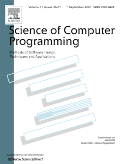
SCIENCE OF COMPUTER PROGRAMMING
Elevating Knowledge in Computer Programming and BeyondScience of Computer Programming, published by Elsevier, is a leading journal dedicated to advancing knowledge in the fields of computer programming, computational theory, and software development. With a focus on interdisciplinary research that spans computational methodologies, information systems, and simulation modeling, this journal plays a vital role in disseminating innovative findings and fostering collaboration among experts in these dynamic areas. With a respectable impact factor and ranked in various Scopus Categories such as computational theory (Q3) and information systems (Q2), it provides a platform for high-quality scholarly articles that push the boundaries of programming science. Although currently not open access, the journal offers invaluable insights for researchers, professionals, and students alike, ensuring they are equipped with the latest advancements and methodologies to thrive in an ever-evolving technological landscape. The journal covers research from its convergence starting in 1981 and continues to welcome groundbreaking contributions as it looks forward to an exciting future through 2025 and beyond.

EMPIRICAL SOFTWARE ENGINEERING
Advancing the frontiers of software engineering through empirical insights.Empirical Software Engineering is a leading journal published by Springer, dedicated to advancing the science and practice of software engineering through empirical research. With an impressive impact factor in the Q1 quartile of the Software category and a Scopus ranking of #76 out of 407 journals, it occupies a prominent position within the field, attracting high-quality submissions from around the globe. Since its inception in 1996, the journal has provided a vital platform for disseminating critical findings that drive the evolution of software development methodologies and practices. While it is not an open-access journal, its rigorous peer-review process ensures that only the most impactful research reaches its readership, making it an essential resource for researchers, professionals, and students looking to stay at the forefront of software engineering innovations. Based in the Netherlands at Van Godewijckstraat 30, 3311 GZ Dordrecht, Empirical Software Engineering continues to set the standard for quality and significance in empirical studies of software systems and processes.

EMITTER-International Journal of Engineering Technology
Connecting Academics and Industry for Enhanced Technological DevelopmentEMITTER-International Journal of Engineering Technology is a distinguished and innovative journal published by POLITEKNIK ELEKTRONIKA NEGERI SURABAYA, focusing on the dynamic field of engineering technology. Since its inception in 2013 as an Open Access journal, it has been dedicated to advancing the dissemination of high-quality research that bridges theoretical knowledge and practical applications. With an ISSN of 2355-391X and an E-ISSN of 2443-1168, EMITTER invites researchers and practitioners to engage with critical topics in electrical engineering, software development, and technology integration. The journal aims to foster a collaborative environment for the sharing of groundbreaking insights that enhance technological development and innovation in engineering practices, making it an essential resource for academics, industry professionals, and students alike in the ever-evolving landscape of technology.